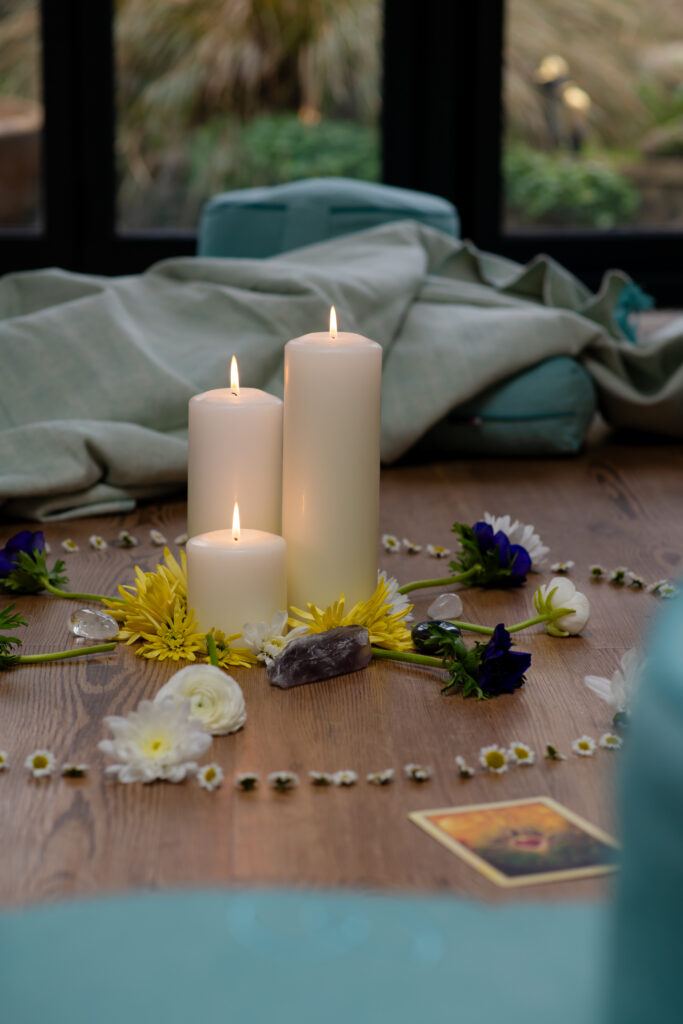Meditate with me

Meditation supports healing and recovery.
One thing I learned very quickly after giving up drinking alcohol, is that you can’t simply take away one coping mechanism, without having something better to replace it with. The risk is that one addiction gives way to another, perhaps more ‘invisible’ pattern of behaviour: smartphone use or online shopping for example. When you look at addiction with a broader lens, many of us have addictive habits that aren’t life threatening but do impact our health, happiness or general wellbeing. My coaching approach is to take a holistic view of recovery and think about recovering wholeness, reconnecting mind and body as well changing behaviours, creating new habits and making lifestyle changes. Meditation has a myriad of benefits to offer from the psychological, physiological, physical, emotional and spiritual.
Meditation is a tool for mindfulness which is the foundation of good self care and being able to make more conscious choices. It enables us to find a place to pause between stimulus and response. That ability to pause is where we can take back control over our impulses. We can also begin to recognise our addictive voice, or our inner critic or judge and choose not to listen to it. Instead of believing the voice that tells us we ‘need’ our substance or behaviour of choice, or we ‘should’ be better because we’re not enough, we can learn to recognise it and shut it down. Over time the neural pathways weaken and those voices grow weaker, until they become a feint whisper we can choose to ignore.
When we’re mindful we become better attuned to our real needs and able to attend to them from a place of care and consideration. Whether we binge eat, drink too much alcohol or spend time ‘doom scrolling’ on social media, meditation empowers us to make different choices. If we experience a recurrence of old coping mechanisms, a compassion based mindfulness practice can help to see it as part of our learning journey instead of using it as a stick to beat ourselves up with. Kristen Neff asserts that with self compassion we are much better able to change our behaviours than with self criticism. When compassion is present we have a much higher chance of trying again, rather than giving up. A compassion based mindfulness practice increases our resilience. These are very significant psychological benefits of meditation.

Many people drink alcohol as a way to ‘self medicate’ depression, anxiety and feelings of stress and overwhelm. The joy of meditation is that it can be used for both prevention or as part of the cure! If I’d learned I could manage feelings of overwhelm and stress with meditation before becoming a parent, I wouldn’t have ended up relying on alcohol to quiet my mind and calm my anxious thoughts. Stress and anxiety are major triggers for depression and meditation can change our reaction to those feelings.
Meditation has physiological benefits, it has been shown to effectively reduce cortisol and adrenaline levels in the body through its calming and stress-reducing effects. When we engage in a regular practice, our bodies enter a state of relaxation. This activates the parasympathetic nervous system, moving us out of the “fight or flight” response triggered by cortisol and adrenaline during stressful situations. As we meditate, our breathing and heart rate slow down, allowing the body to release tension and stress. Consistent practice over time can lead to lowered cortisol and adrenaline levels . This reduction in stress hormones promotes overall well-being, helps manage anxiety, and contributes to improved physical and mental health.
When it comes to the physical benefits, meditation is proven to improve sleep which is a cornerstone of good health and wellbeing. Poor sleep can be a reason people become addicted to substances in the first place either by self medicating with alcohol or use of prescription medication. We need sleep in order to heal the body and to help regulate the nervous system. The less sleep we get, the more easily stressed we become and the more we might rely on drugs or alcohol to cope- it’s a vicious cycle.
There is also evidence that meditation can help with chronic pain, by triggering the release of endorphins – the body’s natural pain killers. It is not uncommon that sufferers come away from medical appointments feeling unseen and unsupported. This can drive a dependency on pain relieving medications and sometimes alcohol, meditation is an accessible and empowering alternative.

I can support you to develop a daily meditation practice
I began my meditation practice to become more present in my life and help relieve stress and overwhelm. An added benefit is that my spirituality has deepened, I’ve begun to find greater meaning in life. Studies show that spirituality is a major protective factor against anxiety and depression.
Through regular meditation practice, it is possible to develop greater awareness, compassion, and presence – living in the present moment. Meditation enables us to access a sense of inner peace and calm and provides a gateway to our inner wisdom and intuition. By quieting the monkey mind and tuning into the present, we can connect with a deeper sense of purpose and meaning in life. We may also experience a sense of interconnection with others and the universe and gain a deeper understanding of our place in the world.
More freedom, more joy, more peace
Meditation contributes to increased happiness and joy because we develop a deeper connection with our inner selves. We become less caught up in worries about the past or anxieties about the future. We develop greater emotional resilience, learning to observe and accept our thoughts and feelings without judgement. As we become more aware of our mental patterns, we gain the power to reframe negative thought processes and choose more positive and uplifting perspectives. When we begin to create change from within, there is no longer a necessity to reach outside of ourselves to find happiness, comfort or relaxation. We have the power to change how we behave, think, feel and function as an organism. Meditation has been around for many thousands of years; it is a scientifically proven, portable, infinite resource that we have at our disposal – we’d be mad not to harness its power.

You don’t have to go it alone
After years of convincing myself I couldn’t meditate, one day I realised it was really what I needed, so I began to try. I could sit for 5 or 10 minutes to begin with but I’d soon find my phone in my hand or I’d give up because there was a sense that I needed to be ‘doing something’ other than sitting.
My personal meditation practice took hold when I began practicing in a group. There is power in a group dynamic, including an online zoom group. You could be sitting in your own space at home, with your camera off but somehow knowing that other people will be showing up at the same time to do the same thing, makes the pull much stronger than attempting to sit alone each morning.
Along with my 30 minute 1:1 meditation sessions, I also offer group drop in sessions and beginners courses. Please check the Bookings page to see what is currently on offer, or reach out by email to discuss your needs.
Frequently Asked Questions
How often should a beginner meditate and for how long?
The real benefits of meditation are experienced once it becomes a daily practice, part of our every day routine. For that reason I suggest starting with once per day, for an amount of time that feels easily manageable, that might be 5 or 10 minutes at first. Once you have incorporated your new habit, it will be easier to gradually increase the amount of time you sit for. Try not to do too much too soon and put yourself off, remember consistency is key.
Does it really work, is there evidence to prove it?
Yes it does, and there is, there have been over 1000 studies published! Studies show it can help reduce worry, stress, anxiety, and depression. It can help improve concentration, self control and memory. Physical benefits include lowered blood pressure and heart rate, deeper slower breathing and a reduction in cholesterol levels. In fact, the NHS are now beginning to recognise the benefits of meditation and are recommending it to patients.
Are your classes aligned with any particular religious beliefs?
No they aren’t. Yes, meditation is practiced in many different religions but whether you are Christian, Buddhist, Atheist or Humanist my meditation classes are accessible. Meditation isn’t a belief system, it’s a psychological practice. Much like going to the gym to strengthen your muscles, regular meditation strengthens different areas of the brain. I firmly believe that everyone should have access to the incredible benefits of meditation.
Your classes are an hour long, what exactly happens during that time?
Don’t worry, we won’t be sitting and meditating for the whole duration! During each class we will practice at least 2 or 3 different meditations, each lasting up to about 10 minutes. There will also be some short talks, opportunities to ask questions and share thoughts and experiences with one another.
I’ve heard that meditation can cause some strong emotional reactions, is that true?
Yes, meditation can release emotions and there’s a good reason why that might happen… in our modern busy lives we might overlook or push our emotions away, often without realising we’re doing it. In the practice of meditation we are allowing the mind to settle, we become still. In that settling down and stillness, we might begin to notice the emotions that we’ve unconsciously been avoiding as they rise up to the surface. This can be uncomfortable at first, especially if we’re not used to feeling these emotions but this is completely natural and doesn’t mean that anything is wrong. (There will be more guidance and information on handling uncomfortable emotions in the information booklet you will receive before the course begins).